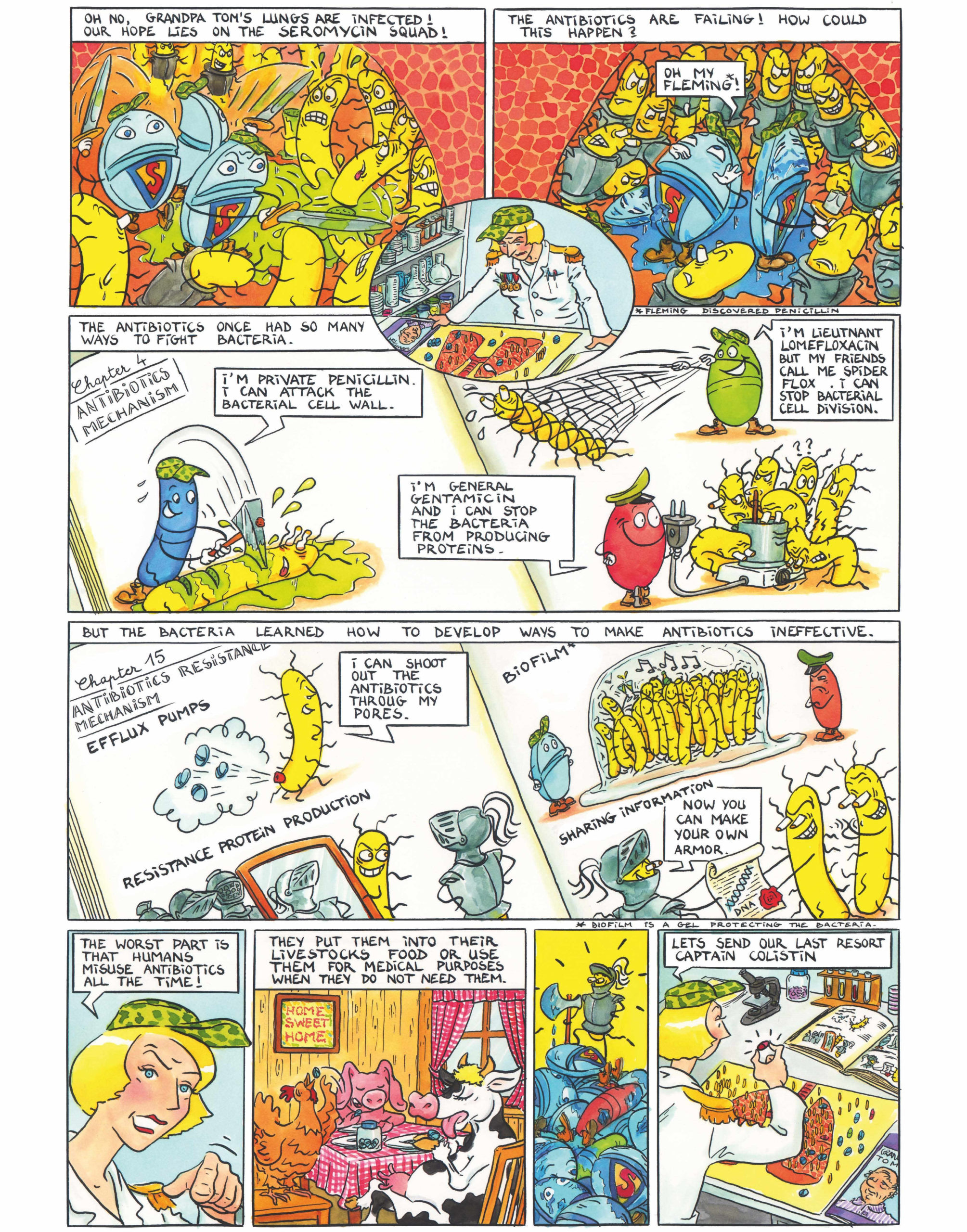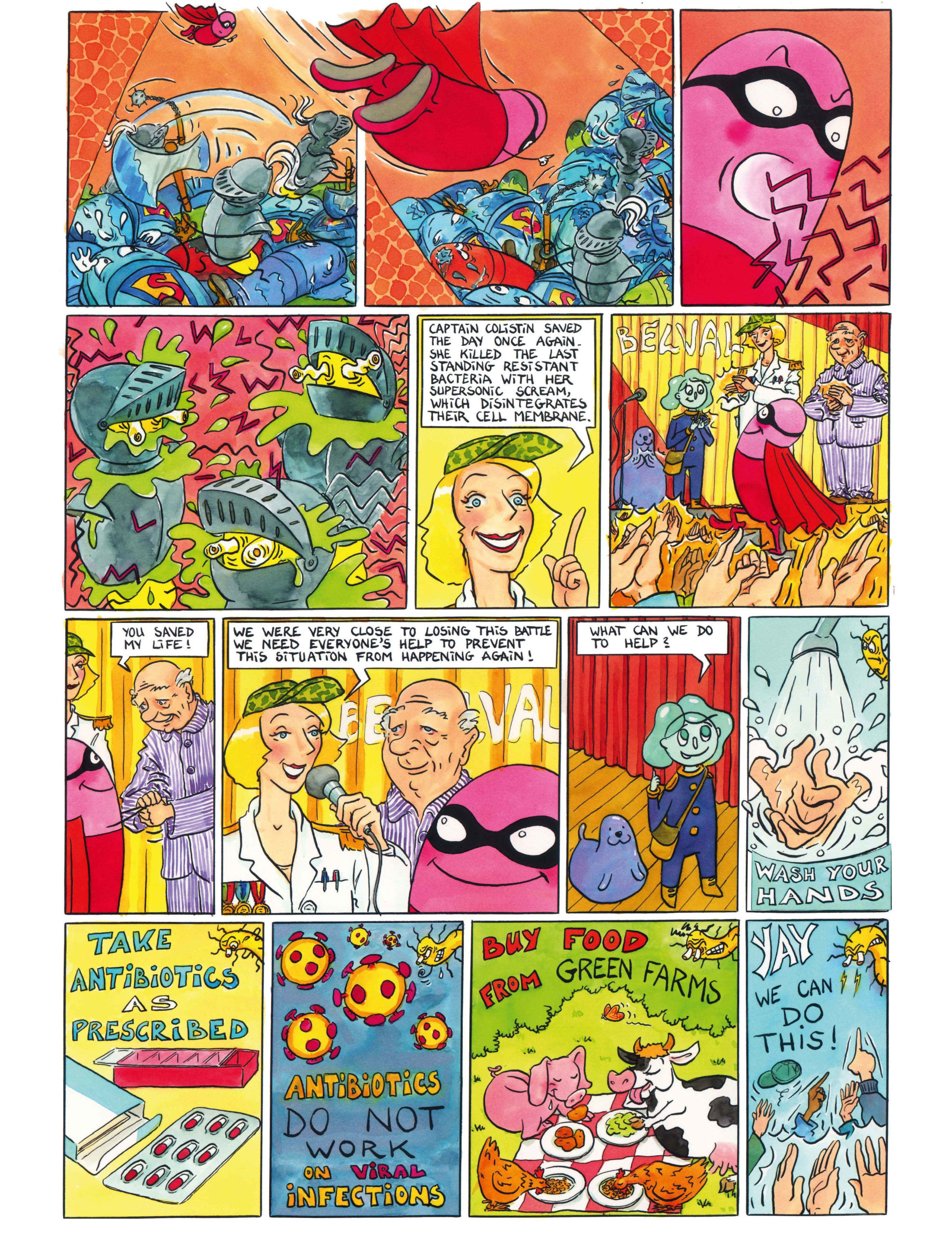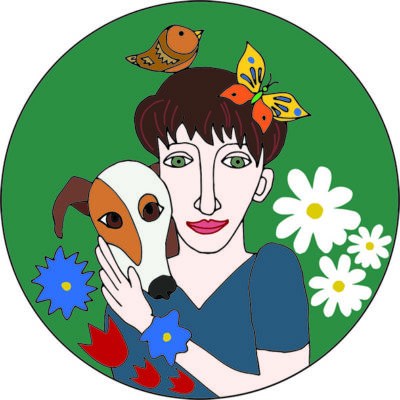Comics
Keeping up With the Bacteria
ARTIST
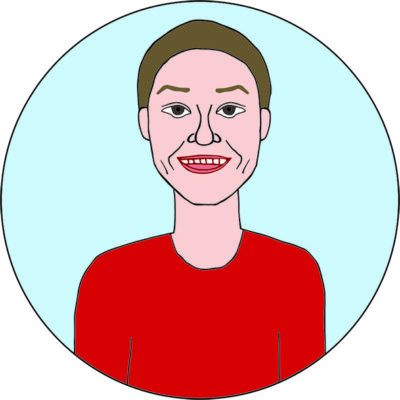
PASCALE VELLEINE
Pascale Velleine, born in Luxembourg, studied at the Federal Academy of Arts Düsseldorf. She has been working as a freelance artist since 1986. Loves living in Paris since 1992.
She draws various comic series, like Paula for the women’s magazine ‘Brigitte’ and works in cooperation with Lucien Czuga on Déi Branchéiert, Ballast & Klüger and Jamie Blond, de Spioun vun der Kroun.
Location
Paris, France
Artistic Focus
«ligne claire» & humour
Contributions to LUX:plorations:
Beware the Eye in the Sky
Keeping up With the Bacteria
Why did you participate in LUX:plorations?
“When Serge Haan came to meet luxemburgish bandes dessinées artists in Contern at the festival in summer 2019 and presented the first Descom.Uni.lu book « Wëssenschaft zu Lëtzebuerg – Ënner d’Lupp geholl », I immediately agreed to participate to further projects and agreed with him, that the concept is a very good idea, as I had already had a similar experience.”
What did you like most about LUX:plorations?
“The teamwork! Drawing is a quite solitary profession. Working with brilliant students and fantastic university teachers was definitely enriching.”
What was the biggest challenge for you?
“Creating bandes dessinnées in a foreign language. Almost no one in the groups used his own native language.”
SCIENTISTS/AUTHORS
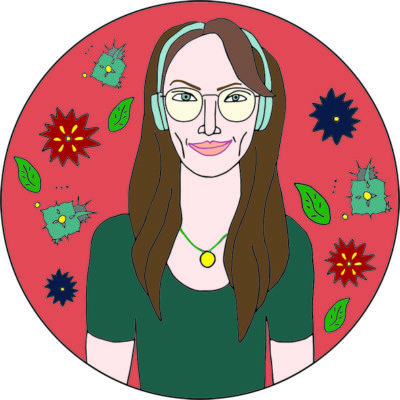
REBECCA CZOLK
Allergies are a major health concern and can prime the immune system for rapid aging. Rebecca’s research tries to unravel the role of the bacteria living in the gut in the development and progression of food allergy.
Research Focus
Allergy
Affiliation
Molecular and Tranlational Allergology
Department of Infection and Immunity
Luxembourg Institute of Helath (LIH)
Contributions to LUX:plorations:
Keeping up With the Bacteria
Why did you participate in LUX:plorations?
“I think informing the public about research is one of the most important aspects of being a scientist. Comics can be such a fun way to reach a broad audience and explain complex topics in an easily understandable way.”
What did you like most about LUX:plorations?
“Working with the artists was such a great experience. Their creative perspective really brought a new aspect to our team.”
What was the biggest challenge for you?
“My biggest challenge was breaking down a complex issue without leaving out too much.”
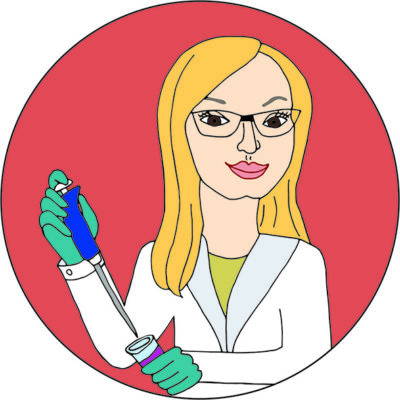
BIANCA BRANDUS
“My research focuses on the development of a new therapeutic strategy against a bacterium causing severe lung infections in patients with compromised immune defenses.”
Research Focus
Immunology, Transitional research
Affiliation
HIV Clinical and Translational Research, Department of Infection and Immunity
Luxembourg Institute of Health (LIH)
Contributions to LUX:plorations:
Keeping up With the Bacteria
Why did you participate in LUX:plorations?
“I always loved to imagine the “fight” happening in our body between pathogens and the immune system. The comic was a great opportunity to visualize my thoughts.”
What did you like most about LUX:plorations?
“It was good to see my research from another perspective.”
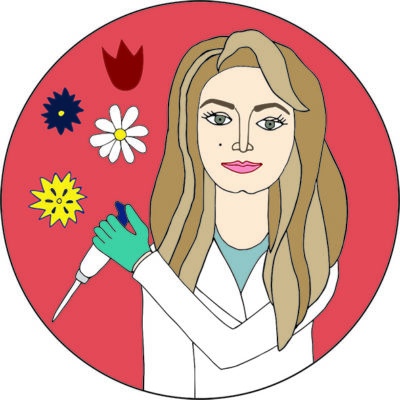
RAFAËLA SCHOBER
“My research focusses on finding a potential cure for HIV-1 infection. Indeed, there is a treatment available called antiretroviral therapy (ART) but it does not completely eradicate the virus, which makes it a lifelong commitment. Natural killer (NK) cells are very important in the recognition and killing of infected cells or cancer cells. I developed a new immunotherapeutic molecule that activates the NK cells against HIV-1 infected cells.”
Research Focus
Immunotherapy
Affiliation
HIV Clinical and Translational Research
Department of Infection and Immunity
Luxembourg Institute of Health (LIH)
Contributions to LUX:plorations:
Keeping up With the Bacteria
Why did you participate in LUX:plorations?
“I always enjoyed talking about my research with my friends and family and I love to see how fascinated they are about it.”
What did you like most about LUX:plorations?
“I loved the creativity breaks in the very lab-oriented workdays. I also enjoyed interacting with the other members of the group and seeing the comic evolve into an incredible story.”
MENTOR
VERONIKA MISCHITZ
Veronika Mischitz (Véro) is a former biologist, turned freelance visual storyteller. For over a decade, she focuses on visualizing and communicating science to broad audiences from various backgrounds through the medium comics. Driven by curiosity and a sense of wonder, she loves to explore unknown territory, learn new things along the way and turn them into compelling stories. Veronika is also teaching the magic of her craft to kids and adults. She is a mentor for LUX:plorations.
Work Focus
Visual communication, storytelling, science comics
Contributions to LUX:plorations:
Modern Talking
Keeping up With the Bacteria
Was it Really About Nature?
Losing Orientation
Why Science Comics?
A Furry Tale
A Gut Feeling
The Adventures of Tuwwo the Water Molecule
Math, Magic and Maryam
Why did you participate in LUX:plorations?
“As a comic artist and science communicator LUX:plorations is a dream come true: A group of highly motivated experts from different fields joining forces and creating outstanding science comics as a result!”
What did you like most about LUX:plorations?
“Working with such motivated, open and mindful participants as well as team members from different fields of research was amazing. Creativity and inspiration grew from our efforts as we explored new toolkits and skills together.”
What was the biggest challenge for you?
“Ensuring ongoing attention and support for all participants was extremely important to me and more challenging in an online-setting. But I think the whole team did a great job on that.”
SUPERVISOR
BRUNO TEHEUX
Bruno Teheux is a researcher in the Department of Mathematics (DMATH) at the University of Luxembourg. He also likes to organise activities that allow as many people as possible to experience the multiple aspects of mathematical research and to become aware of the incredible modernity of this discipline. Where there is no fun, there is no math!
Work Focus
Mathematics, research, science communication, higher education
Contributions to LUX:plorations:
Keeping up With the Bacteria
Beware the Eye in the Sky
Becoming an Agent of Change
A Furry Tale
Why did you participate in LUX:plorations?
“I lead the creation of the first comics booklet entitled ‘Through The Looking Glass’ and I was willing to pursue since science and comics are two complement ways to understand the world.”
What did you like most about LUX:plorations?
“The interactions between Phd candidates and artists were amazing. The resulting pieces of art are much more than the simple sum of their inputs.”

Go through below quiz and check how much YOU know about antibiotics.

#1. Antibiotics don’t work on…
Select all that apply:
Antibiotics only work on bacteria that are susceptible to this specific type of antibiotics. Antibiotics don’t work on viruses and funghi. To learn why, try answering the next questions.

#2. Why are antibiotics ineffective against viruses?
Viruses have a different structure and a different way of surviving than bacteria. Technically, they are not even alive. As the name suggests Anti-bio-tics attack living cells in different ways, for example by destroying their cell walls or by damaging the way they reproduce. As viruses don’t have cell walls (only a protective protein coat) or a reproductive system on their own (they make their host cells create new viruses), antibiotics are ineffective against them. But there are so called antiviral drugs that can target them.

#3. Why are antibiotics ineffective against funghi?
Funghi also have a different structure than bacteria. Their cells are much more similar to humans than bacteria. Thus, antibiotics don’t work on funghi. Fun fact: The first antibiotic used in medicine, penicillin, was produced by a funghus, Penicillium rubens.

